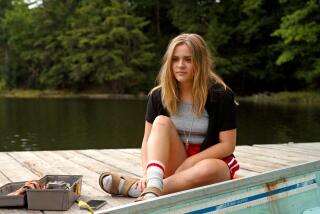TV REVIEWS : ‘Star’ Is TV’s ‘Age of Innocence’ Minus Accuracy
- Share via
What fortuitousness! If you can’t get to a theater this week to catch “The Age of Innocence,” there’s a TV movie on the tube tonight that features nearly the same plot: “Danielle Steel’s ‘Star’ ” (at 9 on NBC, Channels 4, 36 and 39).
In the Michelle Pfeiffer role, substitute pert, young Jennie Garth (“Beverly Hills, 90210”) as the slightly scandalized, earthy blond who has the misfortune to fall for an already betrothed upper-crust lad. The equivalent of Daniel Day-Lewis here, meanwhile, is handsome Craig Bierko, playing the scion of high society who wants to break free from class restrictions and go for the life of true passion his earthy secret lover represents.
Instead--as in the other picture--he tragically proceeds forth with an empty marriage to his adoring yet jealously conniving brunette fiancee, leaving the heroine, his real soul mate, to fall into the clutches of a more brutal suitor.
From Wharton to Steele . . . the Zeitgeist is a wonderful thing.
Still, speaking of class differences, there are some disparities the potential viewer might want to beware. “Star” takes place a century later than “Age of Innocence,” in the late 1960s and ‘70s, which eliminates Victorianism and substitutes romance-novelism as a rationale for the utterly stupid actions of each character.
Here Garth is--as she’s described by her rival--”a farm girl-cum-nightclub singer” who leaves the ranch to seek fame in the San Francisco of the late ‘60s as a bad pop balladeer, earning gold records and movie deals faster than you can say “Valley of the Dolls.”
The fellow in whom she improbably inspires a career- and marriage-wrecking obsession lasting more than a decade is Bierko, an idealistic Robert Kennedy aide (sample dialogue: “You were working with Sen. Kennedy. I’m sorry about that. The assassination was horrible”) whose political fortunes are tied to his wife’s family.
Director Michael Miller and scripter Claire Labine take at least one other pointed departure from Martin Scorsese, in not going to such great pains to re-create their intended period. Not a single pain. You’d think in hippie-era San Francisco someone might have so much as a mini-skirt, Afro or wisp of hair over the collar, but no: The one time Garth’s co-stars should have sideburns, they don’t.
It goes without saying that no one ages a whit, but the biggest laugh comes near the end, when Garth--looking adolescent as ever, even as a retiree and mother--gets a letter announcing the reissue of her old records on CD. The year: pre-digital 1980. Call this silly sudser “The Age of Anachronisms.”
More to Read
The complete guide to home viewing
Get Screen Gab for everything about the TV shows and streaming movies everyone’s talking about.
You may occasionally receive promotional content from the Los Angeles Times.






